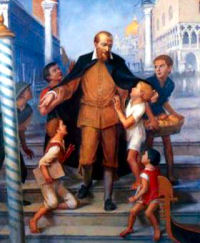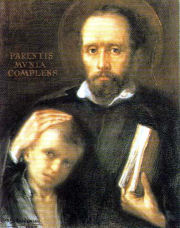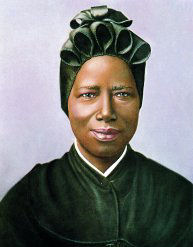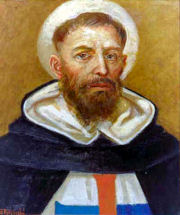14. And king Herod heard of him; (for his name was spread abroad) and he said, That John the Baptist was risen from the dead, and therefore mighty works do show forth themselves in him.
15. Others said, That it is Elias. And others said, That it is a prophet, or as one of the prophets.
16. But when Herod heard thereof, he said, It is John, whom I beheaded: he is risen from the dead.
GLOSS. After the preaching of the disciples of Christ, and the working of miracles, the Evangelist subjoins an account of the report, which arose amongst the people; wherefore he says, And king Herod heard of him.
PSEUD-CHRYS. This Herod is the son of the first Herod, under whom Joseph had led Jesus into Egypt. But Matthew calls him Tetrarch, and Luke mentions him as ruling over one fourth of his father's kingdom; for the Romans after the death of his father divided his kingdom into four parts. But Mark calls him a king, either after the title of his father, or because it was on consonant to his own wish.
PSEUDO-JEROME; It goes on, For his name spread abroad. For it is not right that a candle should be placed under a bushel. And they said, that is, some of the multitude, that John the Baptist was risen from the dead, and therefore mighty works do show themselves forth in him.
BEDE; Here we are taught how great great the envy of the Jews. For, lo, they believe that John, of whom it was said that he did no miracle, could rise from the dead, and that, without the witness of anyone. But Jesus, approved of God by miracles and signs, whose resurrection, Angels and Apostles, men and women, preached, they chose to believe was carried away by stealth, rather than suppose that He had risen again. And these men, in saying that John was risen from the dead, and that therefore mighty works were wrought in him, had just thoughts of the power of the resurrection, for men, when they shall have risen from the dead, shall have much greater power, than they possessed, when still weighed down by the weakness of the flesh. There follows, But others said that it was Elias.
THEOPHYL; For John confuted many men, when he said, You generation of vipers. It goes on, But other said, that it is a prophet or as one of the prophets.
PSEUD-CHRYS. It seems to me that this prophet means that one of whom Moses said, God will raise up a prophet to you of your brethren. They were right indeed, but because they feared to say openly, This is the Christ, they used the voice of Moses, veiling their own surmise through fear of their rulers. There follows, But when Herod heard thereof; he said, It is John, whom I beheaded: He is risen from the dead. Herod expressly says, this in irony.
THEOPHYL. Or else, Herod, knowing that he without a cause had slain John, who was a just man, thought that he had risen from the dead, and had received through his resurrection the power of working miracles.
AUG. But in these words Luke bears witness to Mark to this point at least, that others and not Herod said that John had risen but Luke had represented Herod as hesitating and has put down his words as if he said, John have I beheaded, but who is this of hear such things? We must however suppose, that after this hesitation, he had confirmed in his own mind what others had said, for he says to his children, as Matthew relates, This is John the Baptist, he has risen from the dead. Or else these words are to be spoken, so as to indicate that he is still hesitating, particularly as Mark who had said above that others had declared that John had risen from the dead, afterwards however is not silent as to Herod's plainly saying, It is John, whom I beheaded: he is risen from the dead. Which words also may be spoken in two ways, either they may be understood as those of a man affirming or doubting.
17. For Herod himself had sent forth and laid hold upon John, and bound him in prison for Herodias' sake, his brother Philip's wife: for he had married her.
18. For John had said unto Herod, It is not lawful for you to have your brother's wife.
19. Therefore Herodias had a quarrel against him, and would have killed him; but she could not;
20. For Herod feared John, knowing that he was a just man and a holy, and observed him; and when he heard him, he did many things, and heard him gladly.
21. And when a convenient day was come, that Herod on his birthday made a supper to his lords, high captains, and chief estates of Galilee;
22. And when the daughter of the said Herodias came in, and danced, and pleased Herod and them that sat with him, the king said unto the damsel, Ask of me whatsoever you wilt, and I will give it you.
23. And he swore unto her, Whatever you shall ask of me, I will give it you, to the half of my kingdom.
24. And she went forth, and said unto her mother, What shall I ask? And she said, The head of John the Baptist.
25. And she came in straightway with haste unto the king, and asked, saying, I will that you give me by and by in a charger the head of John the Baptist.
26. And the king was exceeding sorry; yet for his oath's sake, and for their sakes which sat with him, he would not reject her.
27. And immediately the king sent an executioner, and commanded his head to be brought: and he went and beheaded him in the prison,
28. And brought his head in a charger, and gave it to the damsel: and the damsel gave it to her mother.
29. And when his disciples heard of it, they came and took up his corpse, and laid it in a tomb.
THEOPHYL. The Evangelist Mark, taking occasion from what went before, here relates the death of the Forerunner, saying, For Herod himself had sent John and laid hold upon John, and bound him in prison for Herodias' sake his brother Philip's wife: for he had married her.
BEDE; Ancient history relates, that Philip the son of Herod the great, under whom the Lord fled into Egypt, the brother of this Herod, under whom Christ suffered, married Herodias, the daughter of king Aretas; but afterwards that his father in-law, after certain disagreements had arisen with his son in-law, had taken his daughter away, and, to the grief of her former husband, had given her in marriage to his enemy; therefore John the Baptist rebukes Herod and Herodias for contracting an unlawful union, and because it was not allowed for a man to marry his brother's wife during his lifetime.
THEOPHYL. The law also commanded a brother to marry his brother's wife, if he died without children; but in this case there was a daughter which made the marriage criminal: there follows, Therefore Herodias had a quarrel against him, and would have killed him but she could not.
BEDE; For Herodias was as afraid, lest Herod should repent at some time, or be reconciled to his brother Philip, and so the unlawful marriage be divorced. It goes on, For Herod feared John, knowing that he was a just man, and a holy.
GLOSS. He feared him, I say, because he revered him, for he knew him to be just in his dealings with men, and holy towards God, and he took care that Herodias should not slay him. And when he heard him, he did many things, for he thought that he spoke by the Spirit of God, and heard him gladly, because He considered that what he said was profitable.
THEOPHYL. But see how great the fury of lust, for though Herod had such an awe and fear of John, he forgets it all, that he may minister to his fornication.
REMIG. For his lustful will drove him to lay hands on a man, whom he knew to be just and holy. And by this we may see how a less fault became the cause to him of a greater; as it is said, He which is filthy, let him be filthy still. It goes on, And when a convenient day was come, that Herod on his birthday made a supper to his lords, high captains, and chief estates of Galilee.
BEDE, The only men whom we read of, as celebrating their birthdays with festive joys are Herod and Pharaoh, but each, with an evil presage, stained his birthday with blood; Herod, however, with so much the greater wickedness, as he slew the holy and guiltless teacher of truth, and that, by the wish, and at the instance of a female dancer. For there follows, And when the daughter of the said Herodias came in, and danced, and pleased Herod and them that sat with him, the king said to the damsel, Ask of me whatever you will, and I will give it you.
THEOPHYL. For during the banquet, Satan danced in the person of the damsel, and the wicked oath is completed. For it goes on, And he swore to her, Whatever you shall ask of me, I will give it you, to the half of my kingdom.
BEDE; His oath does not excuse his murder, for per-chance his reason for swearing was, that he might find an opportunity for slaying, and if she had demanded the death of his father and mother, he surely would not have granted it. It goes on, And she went forth, and said to her mother, What shall I ask? And He said, The head of John the Baptist. Worthy is blood to be asked as the reward of such a deed as dancing.
It goes on, And she came in straightway with haste, &c.
THEOPHYL. The malignant woman begs that the head of John he given to her immediately, that is, at once, in that very hour, for she feared lest Herod should repent. There follows, And the king was exceeding sorry.
BEDE; It is usual with Scripture, that the historian should relate events as they were when believed by all, thus Joseph is called the father of Jesus by Mary herself. So now also Herod is said to be exceeding sorry, for so the guests thought, since the hypocrite bore sadness on his face, when he had joy in his heart; and he excuses his wickedness by his oath, that he might be impious under pretense of piety. Wherefore there follows For his oath's sake, and for their sakes who sat with him, he would not reject her.
THEOPHYL. Herod not being his own master, but full of lust, fulfilled his oath, and slew the just man, it would have been better however to break his oath, than to commit so great a sin.
BEDE; In that again which is added, And for their sakes who sat with him, he wishes to make all partakers in his guilt, that a bloody feast might be set before luxurious and impure guests. Wherefore it goes on, But sending an executioner, he commanded his head to be brought in a charger.
THEOPHYL. 'Spiculator' is the name for the public servant commissioned to put men to death.
BEDE; Now Herod was not ashamed to bring before his guests the head of a murdered man; but we do not read of such an act of madness in Pharoah. From both examples, however, it is proved to be more useful, often to call to mind the coming day of our death, by fear and by living chastely, than to celebrate the day of our birth with luxury. For man is born in the world to toil, but the elect pass by death out of the world to repose. It goes on, And he beheaded him in prison, &c.
GREG. I cannot, without the greatest wonder, reflect that he, who was filled even in his mother's womb with the spirit of prophecy, and then was the greatest that had arisen amongst those born of women, is sent into prison by wicked men, is beheaded for the dancing of a girl, and though a man of so great austerity, meets death through such a foul instrument. Are we to suppose that there was something evil in his life, to have wiped away by so incomprehensible a death? When, however, could he commit a silo even in his eating, whose food was only locusts and wild honey? How could he offend in his conversation, who never quitted the wilderness? How is it that Almighty God so despises in this life those whom He has so sublimely chosen before all ages, if it be not for the reason, when is plain to the piety of the faithful, that He thus sinks them into the lowest place, because he sees how he is rewarding them in the highest, and outwardly He throws them down amongst things despised, because inwardly he draws them up even to incomprehensible things. Let each then infer from us what they shall suffer, whom he rejects, if he so grieves those whom he loves.
BEDE; There follows, And when his disciples heard of it, they came and took up his corpse, and laid it in a tomb. Josephus relates, that John was brought bound into the castle of Macheron, and there slain; and, ecclesiastical history says that he was buried in Sebaste, a city of Palestine, once called Samaria. But the beheading of John the Baptist signifies the lessening of that fame, by which he was thought to be Christ by the people, as the raising of our Savior on the cross typifies the advance of the faith, in that He Himself, who was first looked upon as a prophet by the multitude, was recognized as the Son of God by all the faithful; wherefore John, who was destined to decrease, was born when the daylight begins to wax short; but the Lord at that season of the year in which the day begins to lengthen.
THEOPHYL. In a mystical way, however, Herod, whose name means, 'of skin,' is the people of the Jews, and the wife to whom he was wedded means vain glory, whose daughter even now encircles the Jews with her dance, namely, a false understanding of the Scriptures; they indeed beheaded John, that is, the word of prophecy, and, hold to him without Christ, his head.
PSEUDO-JEROME; Or else, The head of the law, which is Christ, is cut off from his own body, that is, the Jewish people, and is given to a Gentile damsel, that is, the Roman Church, and the damsel gives it to her adulterous mother, that is, to the synagogue, when in the end we believe. The body of John is buried, his head is put in a dish; thus the human Letter is covered over, the Spirit is honored, and received on the altar.
Catena Aurea Mark 6





 A careless and irreligious soldier for the city-state of Venice, Jerome was captured in a skirmish at an outpost town and chained in a dungeon. In prison Jerome had a lot of time to think, and he gradually learned how to pray. When he escaped, he returned to Venice where he took charge of the education of his nephews—and began his own studies for the priesthood.
A careless and irreligious soldier for the city-state of Venice, Jerome was captured in a skirmish at an outpost town and chained in a dungeon. In prison Jerome had a lot of time to think, and he gradually learned how to pray. When he escaped, he returned to Venice where he took charge of the education of his nephews—and began his own studies for the priesthood.  For many years, Josephine Bakhita was a slave, but her spirit was always free and eventually that spirit prevailed. Born in Olgossa in the Darfur region of southern Sudan, Josephine was kidnapped at the age of seven, sold into slavery and given the name Bakhita, which means fortunate. She was resold several times, finally in 1883 to Callisto Legnani, Italian consul in Khartoum, Sudan.
For many years, Josephine Bakhita was a slave, but her spirit was always free and eventually that spirit prevailed. Born in Olgossa in the Darfur region of southern Sudan, Josephine was kidnapped at the age of seven, sold into slavery and given the name Bakhita, which means fortunate. She was resold several times, finally in 1883 to Callisto Legnani, Italian consul in Khartoum, Sudan.  John of Matha, the founder of the Trinitarian Order, was born at Faucon, on the borders of Provence, in France. He was trained as a young noble in horsemanship and the use of arms, decided to study for the priesthood, and was ordained in Paris. After some years in solitude, he conceived the idea of founding an order to ransom Christian captives from the Muslims and went to Rome to obtain the blessing of Pope Innocent III.
John of Matha, the founder of the Trinitarian Order, was born at Faucon, on the borders of Provence, in France. He was trained as a young noble in horsemanship and the use of arms, decided to study for the priesthood, and was ordained in Paris. After some years in solitude, he conceived the idea of founding an order to ransom Christian captives from the Muslims and went to Rome to obtain the blessing of Pope Innocent III. 

